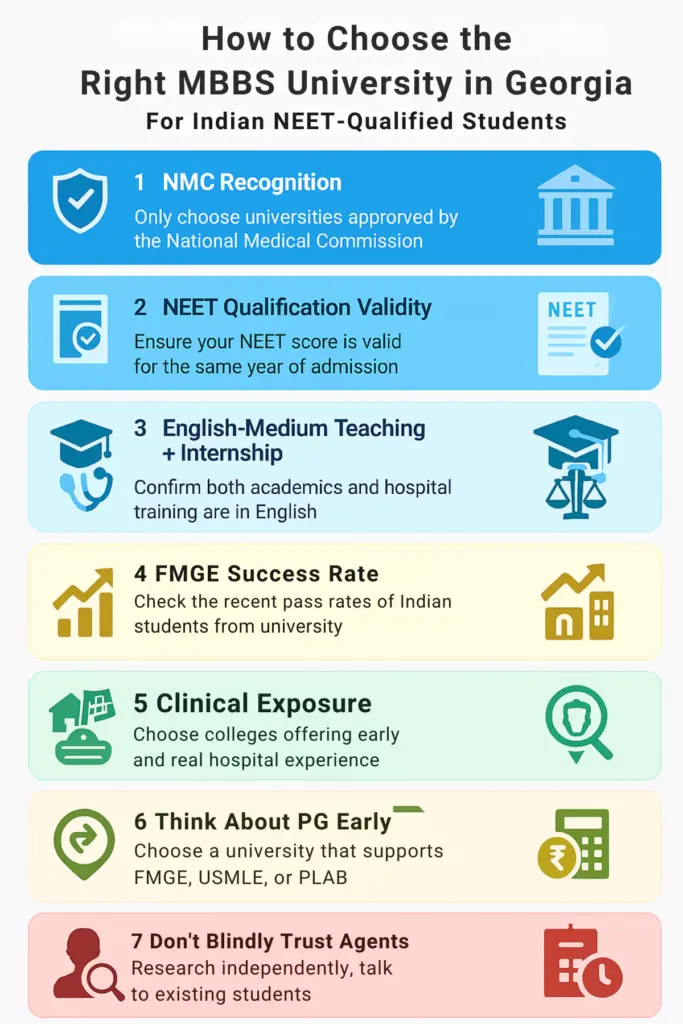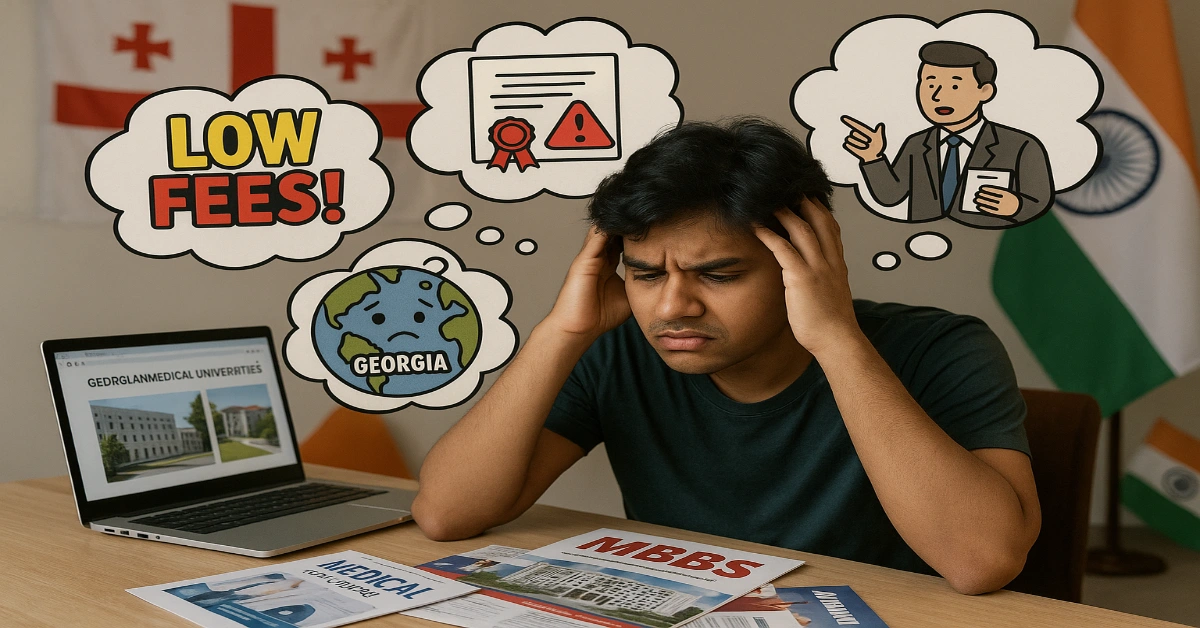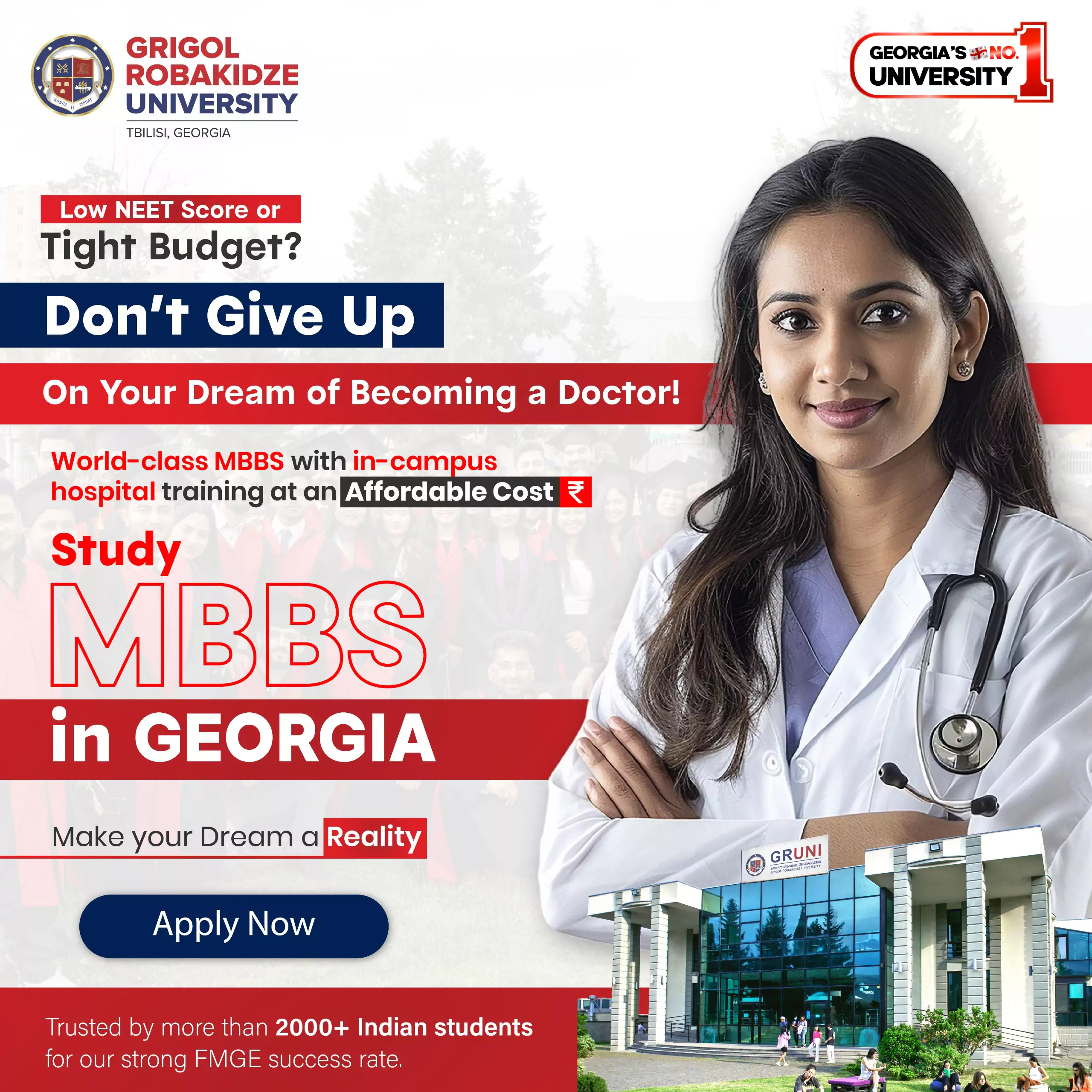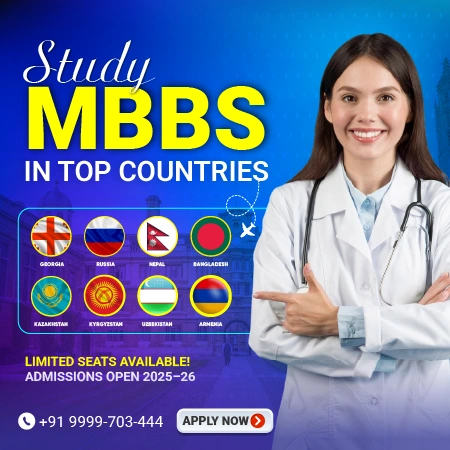In recent years, Georgia has emerged as a popular destination for Indian students aspiring to pursue an MBBS degree abroad. With affordable tuition fees, globally recognised universities, and English-taught programs, it’s no surprise that thousands of Indian students consider Georgia a valuable alternative to Indian private medical colleges. However, in the rush to secure a seat abroad, many students make critical errors in judgment that can impact their education, career, and even future licensing.
Here’s an in-depth overview of the top mistakes Indian students make when choosing MBBS in Georgia, and how to avoid them.
MBBS in Georgia: 11 Mistakes Indian Students Make
1. Choosing a Non-NMC Aligned University
The Mistake:
Many students enroll in Georgian universities without verifying whether the institution is aligned with the National Medical Commission (NMC) of India. Studying at a non-approved university can result in the inability to appear for the Foreign Medical Graduate Examination (FMGE), both of which are required to practice in India.
How to Avoid It:
Before applying, always cross-check the university’s name on the medical colleges’ list of global institutions like WDOMS. The National Medical Commission (NMC) does not specifically recognise any individual university, but through its regulations, like NMC FMGL 2021, issues guidelines that students studying MBBS abroad must follow..
2. Not Researching the Language of Instruction and Internships
The Mistake:
Some students assume all MBBS programs in Georgia are 100% in English. While classroom teaching might be in English, clinical training and hospital internships are often in the Georgian language, which creates a major barrier for Indian students.
How to Avoid It:
Choose universities where you can do hospital training with English-speaking doctors, or where they teach you the Georgian language in the beginning. Also, ask if hospital work is done in English or Georgian before you take admission.
3. Ignoring the FMGE Pass Rate of the University
The Mistake:
Many students choose a university just because the tuition fees are low or someone recommended it, without checking how its graduates perform in exams like FMGE, which is risky. A university might offer a degree, but if it doesn’t prepare you well for licensing exams, your entire investment may go to waste.
How to Avoid It:
Before making a decision, look into how Indian students from that university have qualified in the FMGE over the last few years. This gives a good idea about the quality of education, clinical exposure, and academic support.
Note:
One of the universities where Indian students have had a positive experience is Grigol Robakidze University in Tbilisi. It is NMC aligned, offers the entire MD (equivalent to MBBS) program in English, and has tie-ups with good hospitals in the capital for clinical training. Students often mention that the university maintains small class sizes, which helps in getting better attention from faculty.
If you’re planning long-term, especially to practice in India after pursuing MBBS, choosing a university like Grigol Robakidze University can give you an advantage both academically and practically.
4. Underestimating the Cost of Living and Hidden Expenses
The Mistake:
Many students calculate their budget based only on tuition fees and neglect to account for living expenses, visa renewals, insurance, books, travel, and local transport. The actual cost can be significantly higher than initially expected.
How to Avoid It:
- Ask for a detailed year-wise expense sheet, including hostel, food, and miscellaneous costs.
- Consider city-wise living standards. Tbilisi and Batumi are more expensive than smaller cities like Kutaisi or Rustavi.
- Always keep a buffer of ₹1.5–2 lakhs/year for unexpected costs.
5. Failing to Verify Hostel and Food Arrangements
The Mistake:
Students often accept agent promises about “Indian hostels” or “Indian mess facilities” without confirmation. Upon arrival, they face poor living conditions, lack of hygiene, or no Indian food at all.
How to Avoid It:
- Ask for recent photographs/videos of hostel rooms, kitchens, and food facilities.
- Try to get in touch with existing Indian students to get honest reviews.
- If possible, consider renting shared apartments in later years for more comfort and flexibility.
6. Misunderstanding the Degree Format – MD vs. MBBS
The Mistake:
In Georgia, you get an MD (Doctor of Medicine) degree instead of an MBBS. Some Indian students think this makes them ineligible for licensing in India or believe the degree is not valid.
How to Avoid It:
Understand that the MD degree from Georgia is equivalent to the MBBS in India and is academically aligned with NMC, as long as:
- The course duration is at least 54 months + 12 months of internship.
- The degree is earned from an NMC-aligned university.
- You clear the FMGE exam upon return.

7. Not Considering the Impact of Lack of Practical Exposure
The Mistake:
Several Georgian universities lack sufficient clinical exposure or don’t allow students to fully participate in hospital work due to language and policy barriers.
How to Avoid It:
- Prefer universities that are attached to multi-specialty government hospitals.
- Ask whether the internship is hands-on and what kind of clinical work Indian students are permitted to do.
- Avoid institutions where clinical rotations happen only in private setups with limited patient inflow.
8. Ignoring Visa Rules, Work Restrictions, and Attendance Policies
The Mistake:
Students often don’t read the fine print of visa validity, student attendance rules, and work restrictions. Missing classes or exceeding visa rules can lead to academic penalties or even deportation.
How to Avoid It:
- Stay in regular touch with the university’s international office to understand visa renewals.
- Do not depend on part-time jobs; Georgia doesn’t legally allow most international students to work.
- Maintain 80%+ attendance as required by most medical universities and the NMC for validity of the degree.
9. Assuming MBBS in Georgia is a Shortcut to Becoming a Doctor
The Mistake:
Many Indian students mistakenly believe that studying MBBS abroad, especially in Georgia, is an “easier” route to becoming a doctor, skipping NEET complications and Indian competition.
How to Avoid It:
- Recognise that the academic and licensing journey is equally important.
- You must clear the NEET to get admission and also pass the FMGE exam to practice in India.
- Understand that language, cultural shift, self-study, and adaptability are essential parts of the journey abroad.
10. Not Planning a Career after MBBS Early
The Mistake:
Most students don’t think beyond the MBBS degree and are unprepared for postgraduate studies, FMGE, internships in India, or licensing in other countries like the US, UK, or Germany.
How to Avoid It:
- Start preparing for FMGE from the 2nd year itself.
- If planning for PG abroad (USMLE/PLAB), choose a university with support for those exams.
- Enquire whether the degree is eligible for licensure in countries other than India, based on the WHO/FAIMER listing and the ECTS credit system.
11. Skipping NEET or Enrolling Without a Valid NEET Score
The Mistake:
Some students believe NEET is not required if they are studying abroad. Others enroll using fake or expired NEET scores, which makes their MBBS degree invalid for Indian registration.
How to Avoid It:
- As per NMC regulations, a valid NEET score is mandatory for Indian students enrolling in MBBS abroad.
- Always appear for NEET the same year you’re applying, and retain all NEET documents for future proof during FMGE registration.
Studying MBBS in Georgia can be a life-changing opportunity, offering quality education at an affordable price. However, the decision must be made after thorough research, careful planning, and awareness of long-term implications.
By avoiding these common mistakes, Indian students can make smarter, safer, and more successful decisions when choosing to study MBBS in Georgia.



